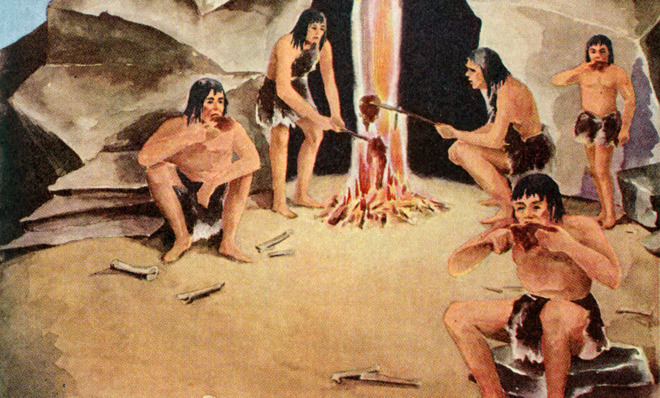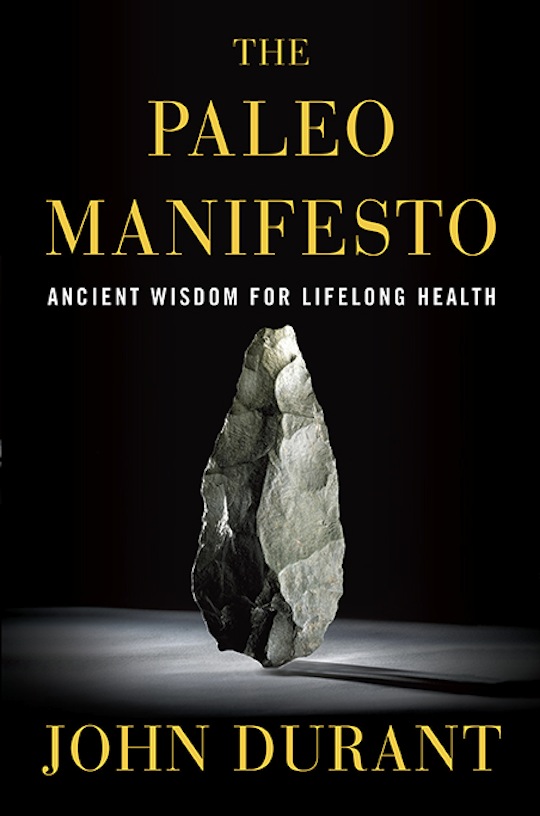Ancient wisdom for lifelong health
This is not just another paleo diet book

A free daily email with the biggest news stories of the day – and the best features from TheWeek.com
You are now subscribed
Your newsletter sign-up was successful

I was excited to read John Durant's book The Paleo Manifesto: Ancient Wisdom for Lifelong Health. Whether or not you're interested in paleo, it's full of interesting nuggets.
Especially the part where Durant explains how fasting can help fight infections.
One indication of this effect comes from the behavior of sick animals, including humans, who often lose their appetite until an illness has passed. Farm animals, pets, zoo animals and wild animals often just stop eating altogether when facing an acute infection or a serious injury. The widespread nature of this phenomenon suggests it's an adaptive response. Loss of appetite isn't a bug, it's a feature.
Like attacking the supply lines of an invading army, dietary restriction weakens pathogens while the immune system mounts a counteroffensive. Tiny pathogens don't have large nutrient reserves and rely on the host for nutrition — therefore manipulating our nutrition is a way to manipulate their nutrition. [The Paleo Manifesto]
This may help explain why religious fasting became so prominent.
The Week
Escape your echo chamber. Get the facts behind the news, plus analysis from multiple perspectives.

Sign up for The Week's Free Newsletters
From our morning news briefing to a weekly Good News Newsletter, get the best of The Week delivered directly to your inbox.
From our morning news briefing to a weekly Good News Newsletter, get the best of The Week delivered directly to your inbox.

The benefits of fasting transcend chronic infections. It's one of the promising areas of cancer research, especially in response to chemo.
Fasting alters the playing field by activating ancient starvation defenses in the cell. Fasting is a signal to the body that resources are scarce. Healthy, nonmalignant cells take the hint and stop dividing as often, focusing instead on cellular repair mechanisms that conserve resources. So even as chemo damages healthy cells, they are hard at work repairing chromosomal damage. But malignant cells don't stop dividing; they're "cancerous" because they refuse to do anything but grow and grow. [The Paleo Manifesto]
This part on gluten was also interesting.
In wheat, for example, gluten makes up the majority of wheat protein. Even though gluten is associated with the small percentage of people with celiac disease, it causes gut inflammation in over 80 percent of people. The gut is the digestive tract, which plays a central role not only in digestion, but in metabolism and immune function as well. Persistent gut inflammation can damage intestinal lining, and large molecules and bacteria can ooze out into the bloodstream — which initiates a reaction from the immune system. Autoimmune disorders occur when the body chronically attacks itself, and a wide variety — lupus, type 1 diabetes and multiple sclerosis — are associated with a leaky, inflamed gut and wheat consumption. [The Paleo Manifesto]
The book is broken into three parts. The first part is a brief history of humanity through five ages of existence — Animal, Paleolithic, Agricultural, Industrial, and Information. Each of these stages provides lessons for how we can be healthier today. The second part looks at how we can apply these lessons to "multiple areas of modern-day life: food, fasting, movement, bipedalism (standing, walking, running), temperature, sun and sleep." The book wraps up with a speculative vision of how our ancient hunter and gatherer roles can inspire us to build healthy lifestyles.
Durant started eating paleo in September of 2006, and some amazing things started to happen. After ten days,
A free daily email with the biggest news stories of the day – and the best features from TheWeek.com
I had much more consistent energy throughout the day. There was no more "head on the desk" after lunch. My mood improved, too. I felt more confident and optimistic. When something negative occurred in my life, I found that I was able to weather it with greater ease. The energy and mood gains in and of themselves were enough to tell me I was on the right track ... Due to the low sugar content in my diet, I stopped getting a thin, filmy residue on my teeth. Industrial food started tasting way too sweet, and I came to enjoy natural flavors more. I lost the cravings for refined carbs — cookies, cupcakes, pasta, muffins and bagels — and I found bready foods to be both salty and bland. My immune system improved dramatically.
Overall, it felt like walking up from a perpetual state of hangover. And once I knew what "good" felt like, it made "bad" feel a whole lot worse." [The Paleo Manifesto]
When it comes to a healthy diet and overall lifestyle, here are Durant's five recommendations.
1. What to eat: Mimic a hunter-gatherer (or herder) diet
Stop counting calories. Eat the right foods: meat, seafood, roots and tubers, leafy vegetables, eggs, fruit and nuts. Experiment with full-fat, fermented dairy. Aim for a diet where the bulk of calories comes from seafood and animals, but the physical bulk comes from plants. Don't be afraid of fat, eat nose to tail, and eat a variety of plants. [The Paleo Manifesto]
2. How to eat: Follow ancient culinary traditions
Respect ancient culinary wisdom. Follow traditional recipes. Eat fermented foods (sauerkraut, kimchi). Eat raw foods (sashimi, ceviche, tartare). Make broths and stocks. Cook at low heat, using traditional fats and oils (coconut oil, beef tallow, butter, ghee, olive oil). Eat your colors. Eat time-honored "superfoods": liver, eggs, seaweed, cold water fish. Enjoy real butter. Salt to taste. Drink tea.[The Paleo Manifesto]
3. What not to eat: Avoid industrial foods, sugars, and seeds
Avoid processed foods of the Industrial Age, including sugar (sweetened foods, table sugar, dried fruit, plus artificial sweeteners) and vegetable oils (canola oil, soybean oil, corn oil, peanut oil). Avoid eating large, concentrated quantities of the seed-based crops of the Agricultural Age, such as grains (wheat, corn, barley, oats) and legumes (soy, beans, peanuts). If grains are eaten, go with rice.
Beverages: Drink water as thirsty. Drink traditional beverages in moderation, if desired (tea, coffee, wine, alcohol, milk). Avoid industrial beverages (soda, energy drinks, skim milk). [The Paleo Manifesto]
4. Make it meaningful: Experiment, customize, enjoy
Use these guidelines as a starting point for your own experimentation. Modify according to your own health, goals, tastes and preferences, background and budget. Make your diet meaningful (family recipes, ethnic cuisine). Be comfortable breaking away from it to enjoy life (celebrations, unique experiences). [The Paleo Manifesto]
5. Lead a healthy lifestyle
Sleep as much as possible. Move and exercise regularly. Stay on your feet (stand, walk, run). Get regular, moderate sun. Try some intermittent fasting. Try some hot and cold exposure. Make it meaningful in order to make it an ongoing lifestyle. [The Paleo Manifesto]
If you're looking for diet tips, Durant personally follows the guidelines in Perfect Health Diet by Drs. Paul and Shou-Ching Jaminent.
No, this is not another paleo diet book. It is a lifestyle book full of ancient wisdom and practical advice on everything from diet and sunscreen to barefoot running and screen time. It just might change your life.
More from Farnam Street...
Shane Parrish is a Canadian writer, blogger, and coffee lover living in Ottawa, Ontario. He is known for his blog, Farnam Street, which features writing on decision making, culture, and other subjects.
-
 Why is the Trump administration talking about ‘Western civilization’?
Why is the Trump administration talking about ‘Western civilization’?Talking Points Rubio says Europe, US bonded by religion and ancestry
-
 Quentin Deranque: a student’s death energizes the French far right
Quentin Deranque: a student’s death energizes the French far rightIN THE SPOTLIGHT Reactions to the violent killing of an ultra-conservative activist offer a glimpse at the culture wars roiling France ahead of next year’s elections.
-
 Secured vs. unsecured loans: how do they differ and which is better?
Secured vs. unsecured loans: how do they differ and which is better?the explainer They are distinguished by the level of risk and the inclusion of collateral